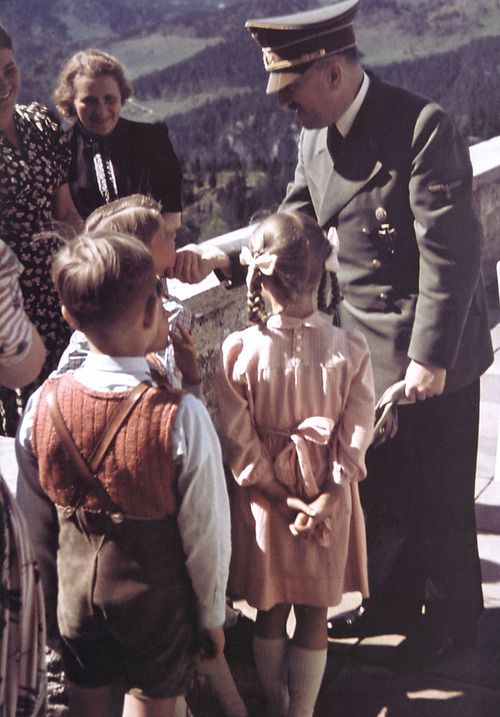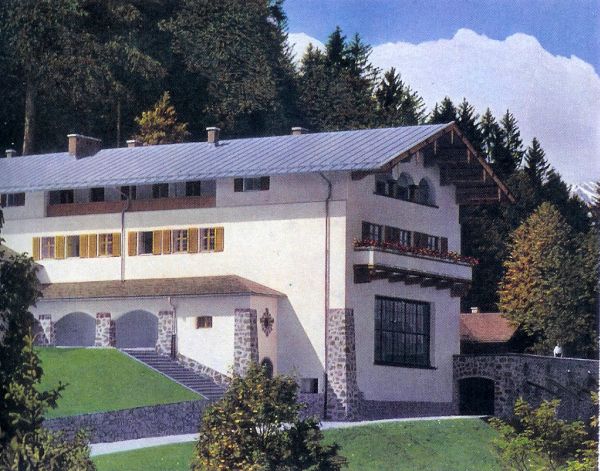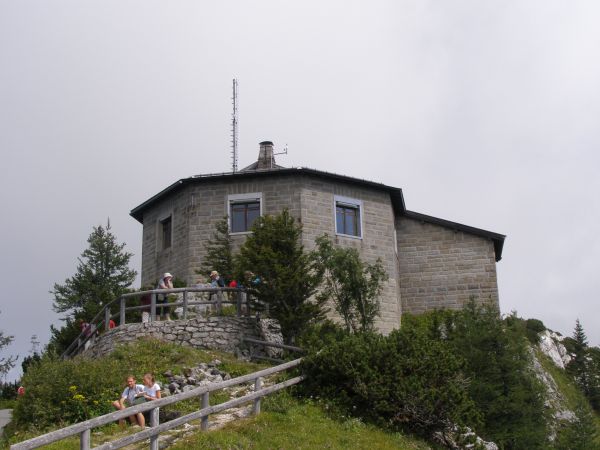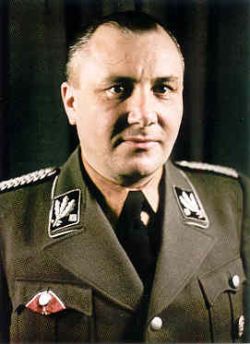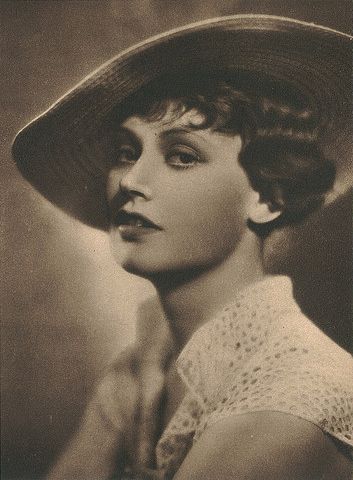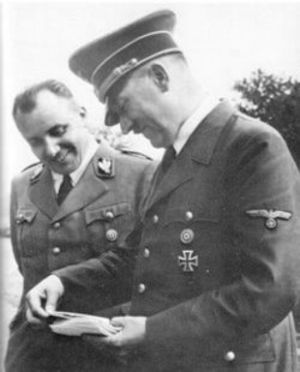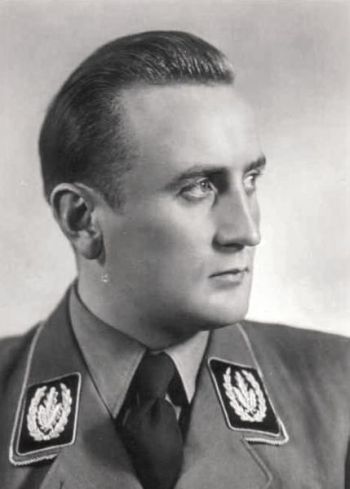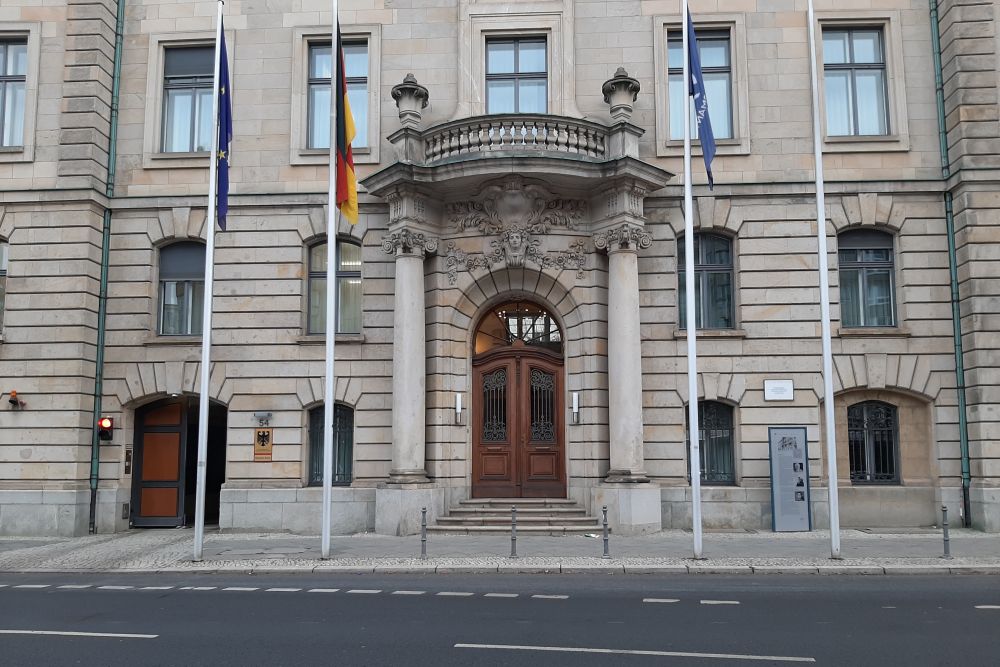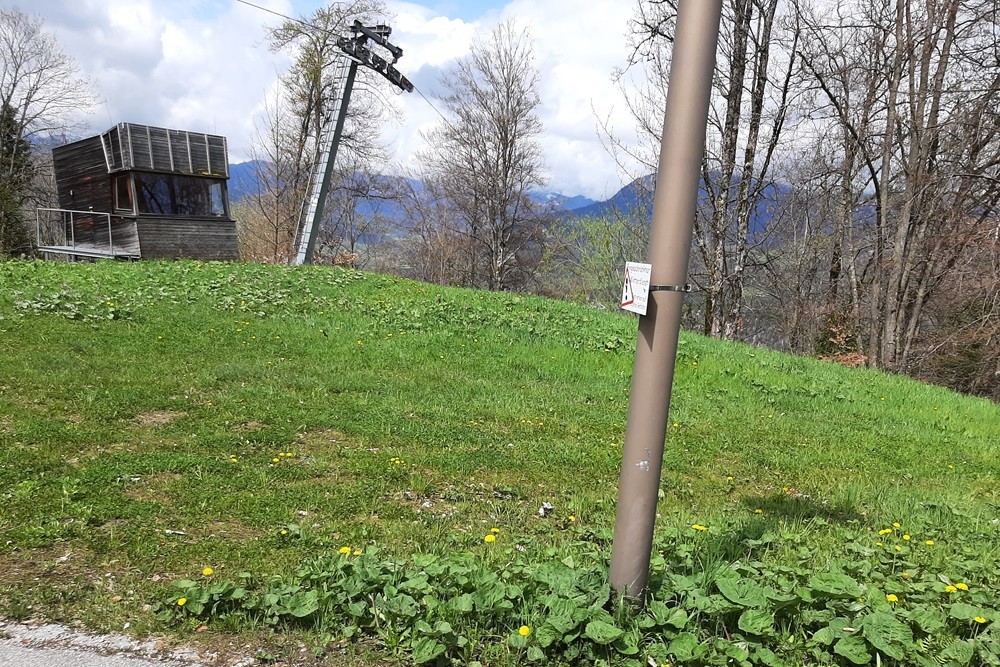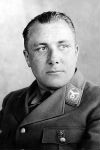Introduction
Martin Bormann is considered by many as "the shadow man". Whatever one may say about this nickname, it is partially correct. Bormann almost never showed up in public; yet his power within the Third Reich was considerable. From April 12th, 1943 onwards, Martin Bormann was Adolf Hitler’s personal secretary. He was always in Hitler’s vicinity and some even consider Bormann the second most powerful man within the Third Reich. In this article a biography of this man will be presented and an attempt is made to discover how vast his power really was.
Images
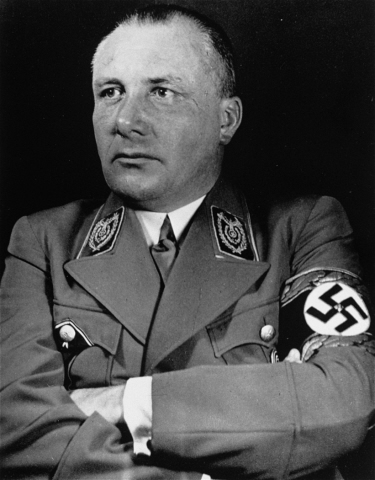 Martin Bormann, the most powerful man within the Third Reich after Adolf Hitler? Source: U.S. National Archives.
Martin Bormann, the most powerful man within the Third Reich after Adolf Hitler? Source: U.S. National Archives.Youth and membership of the NSDAP
Martin Bormann was born June 17th, 1900 in Wegeleben, a small village near Halberstadt in what is now known as the federal state of Sachsen-Anhalt. He was the son of Theodor Bormann, a trumpet player who later became a postal worker, and Antonie Bernhardine Mennong. Martin had an older stepsister and a stepbrother from his father’s first marriage to Louise Grobler who had died in 1898. Theodor married Mennon the same year. During this marriage, three children would be born; Martin, his junior brother Albert and a third child who died soon after birth. A few months after Theodor Bormann had passed away in 1903, Antonie married Alfred Bormann, a bank director and her former brother-in-law. Alfred Bormann had five children from his previous marriage. Martin Bormann was brought up in Lutheranian fashion. The relationship between Martin and his autoritarian stepfather was reportedly very bad.
Little is known about his school years. Bormann himself claimed he had attended a gymnasium but did not graduate. It is certain however that Bormann took a course at an agricultural school. On the outbreak of World War One in August 1914 (in the meantime the family had moved to Weimar), Bormann ran away from home. He applied for voluntary service in the German army but was rejected because of his tender age and his inadequate length. Following this he took a job in a oilmill. In June 1918 he applied for the army again. He was posted to 55 Feldartillerie Regiment (Fieldartillery) as a gunner but he would not see active service for the remaining months of the war. After his discharge from the army, he went to work for the former Oberstleutnant Hermann von Treuenfels. Bormann was employed as a farmhand on the farm in Mecklenburg of this fomer officer. Thanks to his capacity as a leader, he soon rose to overseeer of the Von Treuenfels estate.
Von Treuenfels was a member of the "Deutschvölkische Freiheitspartei" (DFP, German Freedom Party), one of the many right-wing parties in post war Germany. In Mecklenburg, many Freikorpsen (Free Corpses) were active, extreme right-wing paramilitary units consisting of former soldiers who fought the leftist parties in Germany. In 1922, Bormann became a member of the Freikorps Rossbach. This unit was established in November 1918 and had been active in West-Prussia and Latvia. The unit had been named after its commander, the former Lieutenant Gerhard Rossbach. After its involvement in the Kapp-Putsch of March 1920, the unit was recalled to Mecklenburg where it was disbanded, at least officially. Freikorps Rossbach remained active however. Under the guise of an association for vocational education in agriculture, this unit kept up the traditions of the Freikorpsen. The Freikorps also doubled as the military wing of the DFP. The members used Von Treuenfels’ estate as their homebase.
In January 1923, the region of the Ruhr was occupied by French and Belgian troops after Germany had stopped making the rehabilitation payments that were imposed on her by the Treaty of Versailles following Germany’s defeat. Many German citizens resisted this occupation passively and actively. One of these, a World War One veteran and a dedicated extreme right-wing nationalist Albert Schlageter, was executed for sabotage by the French authorities on May 26th, 1923. Freikorps Rossbach suspected the 63 year old Walter Kadow, one of Bormann’s former teachers of his elementary school, of having betrayed Schlageter. Although there was no conclusive evidence, Bormann and his comrades decided to take revenge. After Bormann and three others had gathered enough liquid courage, Kadow was murdered on May 31st, 1923. Some sources claim Bormann had given the order for the murder but he had not been present himself.
Bormann and his accomplices were arrested soon afterwards. Rudolf Höss, one of the prime suspects and the future commander of Camp Auschwitz, was sentenced to 10 years in prison. On March 24th, 1924, Bormann was sentenced to one year in prison for his complicity. After having done his time, Bormann returned to the farm of Von Treuenfels in Mecklenburg. In 1926, Bormann got in trouble with Von Treuenfels, allegedly for having started an affair with his wife.
Consequently, Bormann moved to Oberweimar in 1926 and moved in with his mother. Here he became a member of the Frontbann, an organisation that was set up after the announcement bannnig the SA (Sturmabteiling), the paramilitary wing of the equally forbidden NSDAP. In July 1926, Bormann attended a meeting of this, at the time small extreme right-wing party. That day he also heard, for the first time, Adolf Hitler speak. He was immediately deeply impressed by the future Führer of Germany.
On February 19th, 1927, Bormann officially became a member of the "National Sozialistische Deutsche Arbeiter Partei" or NSDAP (National Socialist German Workers Party). His partymembership number was 60508. Later on, he was awarded the much coveted party badge for having joined the party. Initially, Bormann worked for the extreme right-wing weekly paper "Der Nationalsozialist". Bormann soon rose in the Nazi hierarchy. In 1928, he was named material partyleader in the region of Thüringen. In October 1928, Bormann moved to Munich where he took charge of an insurancefund out of which medical bills were paid on behalf of members of the SA who had become injured in streetfights. In 1930, he expanded this organisation to the "Hilfskasse der NSDAP" a medical insurance for all partymembers. Between 1928 and 1930, Bormann was also on the staff of the SA.
In the same period, he met Gerda Buch. This woman, born October 23rd , 1909 was a dedicatied national socialist, just like Bormann. Her father, the former Major Walter Buch, was also a member of the NSDAP and member of the "Reichstag" (German parliament) since 1927. On January 1st, 1934, he was to be appointed supreme party judge of the NSDAP. Bormann and Hitler met each other for the first time in the home of Buch. Tall, Arian Gerda was almost a foot taller than the squad Bormann and despite the disapproval and opposition of Major Buch, the couple was married anyway on September 2nd, 1929. Witnesses were Rudolf Hess and Adolf Hitler. Seven months later, on April 14th, 1930, their first son, Adolf Martin Bormann was born. Hitler, after whom he was named, became the child’s godfather. After this, nine more children were born: Ilse (later renamed Eike), born July 9th, 1931 (her twin sister died shortly after birth); Irmgard, July 25th, 1933; Rudolf Gerhard (later renamed Helmut Gerhard), August 31st, 1934; Heinrich Hugo (named after his godfather Heinrich Himmler), June 13th, 1936; Eva Ute, August 4th , 1938; Gerda, October 23rd, 1940; Fred Hartmut, March 4th, 1942 and Volker, September 18th, 1943.
Definitielijst
- Freikorps
- German paramilitary units established directly after the Great War by former front soldiers. These groups were often named after their commander. Freikorps formed the basis of the eventual SA or Sturmabteilung.
- Führer
- German word for leader. During his reign of power Adolf Hitler was Führer of Nazi Germany.
- Nazi
- Abbreviation of a national socialist.
- NSDAP
- Nazi Party, byname of National Socialist German Workers' Party, German Nationalsozialistische Deutsche Arbeiterpartei (NSDAP), political party of the mass movement known as National Socialism. Under the leadership of Adolf Hitler , the party came to power in Germany in 1933 and governed by totalitarian methods until 1945.
- Putsch
- Coup, often involving the use of violence.
- Regiment
- Part of a division. A division divided into a number of regiments. In the army traditionally the name of the major organised unit of one type of weapon.
Images
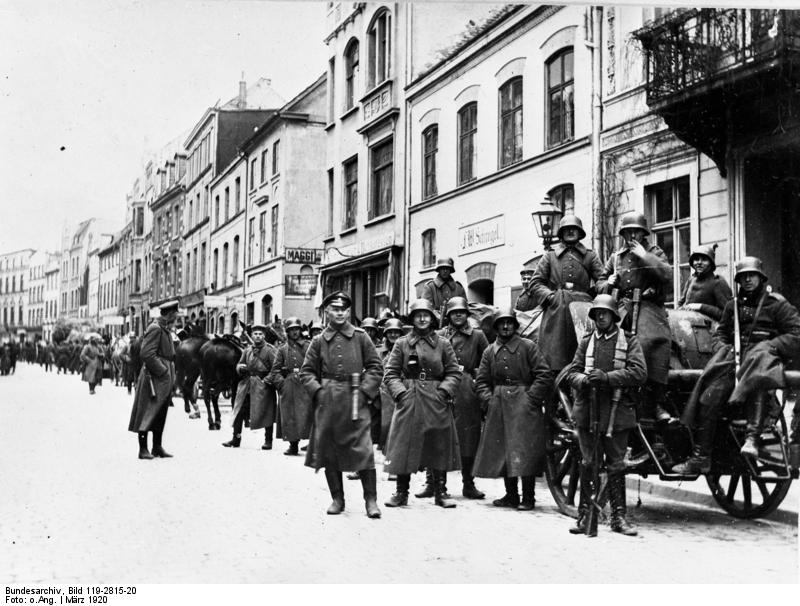 Members of Freikorps Rossbach in Wisbach during the 1920 Kapp putsch. Bormann joined ths Korps in 1922. Source: Bundesarchiv / Wikimedia Commons.
Members of Freikorps Rossbach in Wisbach during the 1920 Kapp putsch. Bormann joined ths Korps in 1922. Source: Bundesarchiv / Wikimedia Commons.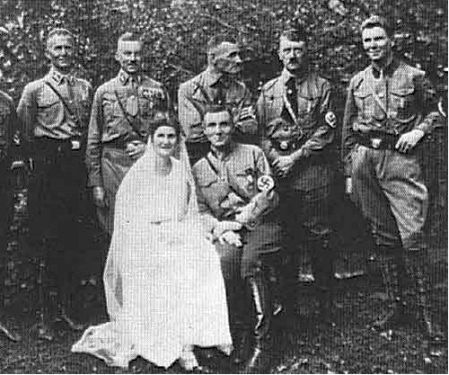 Wedding of Martin Bormann and Gerda Buch. Source: ww2gravestone.com.
Wedding of Martin Bormann and Gerda Buch. Source: ww2gravestone.com.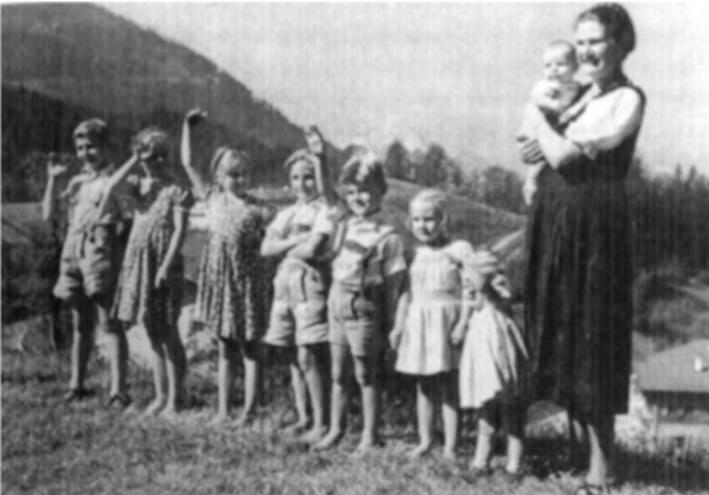 The Bormann family. Source: ww2gravestone.com.
The Bormann family. Source: ww2gravestone.com.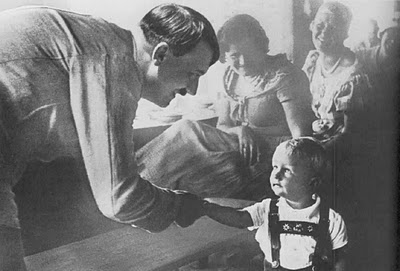 Adolf Martin Bormann with his godfather Adolf Hitler. Source: ww2gravestone.com.
Adolf Martin Bormann with his godfather Adolf Hitler. Source: ww2gravestone.com.The first years in power
After the seizure of power by the NSDAP in 1933, the work of the Hilfskasse der NSDAP was taken over by government agencies. This meant the end of Bormann’s employment for this agency. He was therefore free for another job. He contacted his good friend Rudolf Hess and asked him for a job. Subsequently, on July 1st, 1933, Bormann was appointed Stabsleiter, subordinate to Hess. As the Führer’s deputy, Hess was in charge of the "Parteikanzlei" (Chancellory of the Party) which was called the "Stab des Stellvertreters des Führers" (Staff of the Führer’s deputy) until 1941. Hess could not cope with the increasing workload for this department. Moreover, he despised clerical duties. Bormann’s offer was therefore most welcome. From the moment he entered service, he also acted as personal secretary to Hess. The Parteikanzlei acted as some sort of intermediary between the state and the party, it also interceded in the conflicts which arose between the various party organs. As of 1933, the power of the SA increased dramatically at the cost of the regular party organs.
On October 10th, 1933, Hitler named Bormann "Reichsleiter der NSDAP", the highest rank within the party. In November of the same year he was admitted as a member of the Reichstag. As Hess could not handle all the work and his actions became increasingly paranoïd, Bormann rose quickly to the de facto leader of the Parteikanzlei. Because the NSDAP and the state were unified in Germany, Bormann gained enormous power. Allegedly, Bormann as Stabsleiter busied himself with vastly unimportant tasks such as writing pamphlets on what color of coat partymembers were allowed to wear or not, what font type should be used in printed matter from the party and during which song the Hitler salute should be presented. Consequently, many underestimated the fat man with the bull’s neck who appeared uncouth and clumsy. However, Bormann possessed a sharp memory and an unbridled zest for work. Covertly, he expanded his power and he managed to appropriate ever more functions. He took all work away from Hess who, in his innoncence, did not realize he was forced further and further into the background.
Many people in his direct proximity described him as servile and hypocritical. The Minisier of Finance, Lutz Schwerin von Krosigk said about Bormann: "He plotted and schemed to his heart’s content, even to such an extent that it appeared as abnormal in these circles where intrigues ran wild. He possessed a strong will to assert himself in a way that is only characteristic of Himmler."(Bio Himmler) Bormann saw to it that he gained the authority to fix appointments in the higher echelons of the party, resulting in many people trying to befriend him. His hold on personnel management also became noticable outside the party. If a person applied for a higher function, e.g. judge or professor, the Stabsleiter was asked for advice. If he considered this person to be politically unreliable, chances were slim he would be accepted. It is however unclear how far this power reached but there is one occasion on which Bormann halted the appointment of a professor.
In 1935, Bormann joined the inner circle around Hitler. He was allowed to be present at meetings and accompanied him everywhere. Bormann already started acting as Hitler’s unofficial secretary. In this capacity he passed many messages and excerpts to him. In his years as chief of the Hilfskasse, Bormann had demonstrated to be well acquainted with financial affairs. Hitler therefore charged him with the management of the financial assets of the NSDAP. Because of the increasing growth of the party and the fact that it was lavishly supported by the industry, the wealth of the party increased quickly. Bormann also gained control, albeit after long urging and intrigueing, over Hitler’s personal possessions and financial means.
From 1935 onwards, Bormann continuously remained in Hitler’s vicinity and was always ready to receive orders from him. That and his enormous diligence probably made Bormann very well liked by Hitler. Hitler reportedly remarked once that Bormann could do an amount of work in ten minutes whereas it would take someone else more than an hour. Hitler did see however the negative sides of Bormann. About the Reichsleiter he said: "I know Bormann is coarse. But whatever he takes on, he does it with both hands and feet and I can absolutely trust that my orders will be obeyed immediately, overcoming all obstacles". From his first days in the company of the Führer onwards, Bormann always kept a little notebook on hand, entering all remarks of his leader; whether about politics, the progress of the war, the harmful influence of smoking or the behaviour of dogs. He later had these notes edited by his staff.
(The collected conversations at dinner by Hitler were published after the war).
From 1935 onwards, Bormann was the driving force behind the conversion of the Obersalzberg in Berchtesgaden into one of Hitler’s headquarters and vacation and recreation resort. After having brought pressure to bear on the indigenous inhabitants, Bormann bought all the real estate in the surroundings and had it torn down. 50 houses and farmbuildings were demolished to make room for the buildings of the German dictator and his entourage. The original inhabitants usually received only a small compensation. Those refusing to leave were put under pressure, e.g. by cutting powerlines and even removing the roofs of their houses during the winter.
Hitler had determined exactly what the Obersalzberg should look like and in Bormann he had the perfect master builder. Bormann did everything to please Hitler and saw to it that all Hitler’s ideas were realized. If the Reichsleiter only thought that Hitler wanted something, he swung into action. One day, after Hitler had been standing in the sun for quite a long time, watching a long queue of admirers pass by, he would have said that he was extremely tired from standing in the sunshine. A day later, on Bormann’s orders, a large tree was planted on that spot near the driveway to the Berghof. It became even more radical when Hitler once said that it was a pity that the view from the terrace of the Berghof was interrupted by an old farmhouse. Little more than a day later, the farmhouse had completely disappeared and had been replaced by a green lawn.
Bormann was deeply hated by the many labourers who worked at the Obersalzberg. He treated them roughly, without any respect and did not grant them a moment’s rest. Hotel Platterhof, Hitler’s private quarters and the homes for the other high ranking Nazis were all built on Bormann’s orders. For his own familiy, Bormann had a three story house built, including a shelter. On Bormann’s instructions, the famous teahouse (Kehlsteinhaus) was also built. It served as a present for Hitler on his birthday, April 20th, 1938.
In 1936 Himmler guided a tour of concentration camp Dachau for high ranking partymembers. During this tour, Bormann encountered his old friend Rudolf Höss who was employed as Rapportführer and in this capacity responsible, among other things, for the twice-daily count of the inmates. January 30th, 1937, Bormann was offered the rank of "SS-Gruppenführer" by Reichsführer Heinrich Himmler. This rank within the SS (Schutzstaffel) was more ceremonial in nature and Bormann did not participate in the manifestations of the organization. In recognition of his appreciation, Hitler presented Bormann with the Blutorden (Order of the Blood) in 1938, a high party decoration for which only veterans of the failed Putsch in November 1923 were eligible, as well as those who had served a jail sentence of at least one year as a result of their activities for the party. After all, Bormann had been sentenced for his complicity in the murder of Walter Kadow.
Bormann evolved into the liaison man between Hitler and the party. He was present at all major meetings and in fact directed the Parteikanzlei. Hess was sidetracked more and more. It came to be that no one was allowed to see Hess without a representative of Bormann being present.
Definitielijst
- Berghof
- A villa hidden deep in the Alps built at the top of the Obersalzberg near Berchtesgaden. This villa was property of Hitler and centre of the ”Alpenfestung”. The villa has an enormous complex of tunnels with a length of nearly 11 km. From the Berghof the Third Reich was ruled by Hitler and his close companions. Eva Braun, Hitler’s companion, spent a lot of time there.
- Blutorden
- “Blood Order”. German decoration awarded in 1934 to those members of the NSDAP who had participated in the Bierhalleputsch of 1923.
- concentration camp
- Closed camp where people are being held captive that are considered to be anti- social, enemies of the state, criminal or unwanted individuals. These groups mostly do not get a fair trial or are condemned to doing time in a camp.
- Führer
- German word for leader. During his reign of power Adolf Hitler was Führer of Nazi Germany.
- NSDAP
- Nazi Party, byname of National Socialist German Workers' Party, German Nationalsozialistische Deutsche Arbeiterpartei (NSDAP), political party of the mass movement known as National Socialism. Under the leadership of Adolf Hitler , the party came to power in Germany in 1933 and governed by totalitarian methods until 1945.
- Putsch
- Coup, often involving the use of violence.
Images
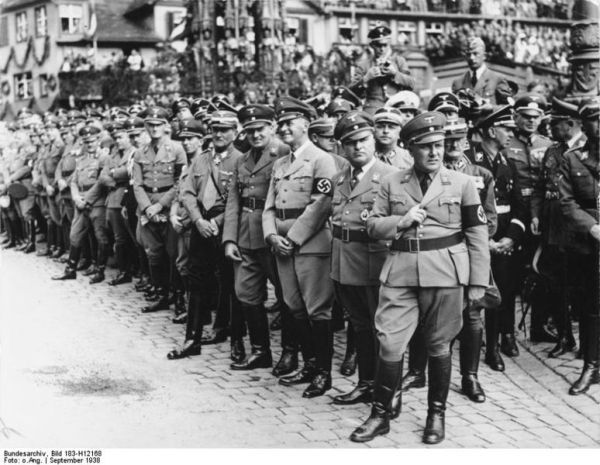 Martin Bormann (front right)`and other Nazi leaders at the 10th partyday of the NSDAP in 1938. Source: Bundesarchiv / Wikimedia Commons.
Martin Bormann (front right)`and other Nazi leaders at the 10th partyday of the NSDAP in 1938. Source: Bundesarchiv / Wikimedia Commons.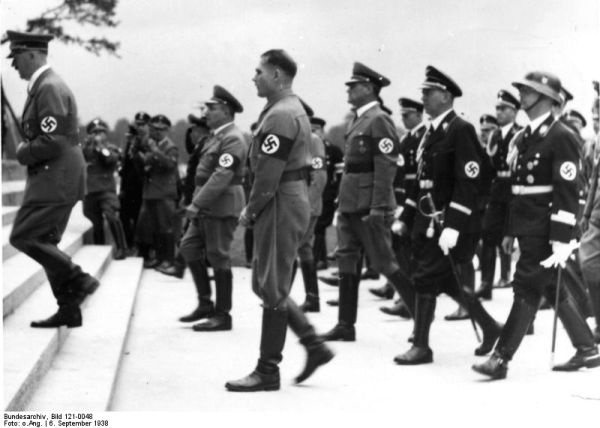 Bormann (rear) and Rudolf Hess (front) follow Hitler closely at the Reichsparteitag in 1938. Source: Bundesarchiv / Wikimedia Commons.
Bormann (rear) and Rudolf Hess (front) follow Hitler closely at the Reichsparteitag in 1938. Source: Bundesarchiv / Wikimedia Commons.The first years of World War Two
With the outbreak of World War Two and the expansion of the Third Reich, the power of the party apparatus and consequently that of Bormann increased. He appropriated many functions that in fact lay within the sphere of the armed forces or other administrative departments. He increased the power of the NSDAP ever further. The party became all-encompassing and directed almost everything. Ultimately it would come to be that there were only two organizations left wielding political power within the Third Reich: the SS and the party.
In 1941, an incident occurred causing Bormann to climb even higher in the Nazi hierarchy. May 10th, the Stellvertreter des Führers (deputy of the Führer) Rudolf Hess flew to Scotland thinking he would be able to make peace with Great Britain. Hitler declared Hess had become insane and on May 12th, he named Bormann as Hess’ successor as chief of the Parteikanzlei, which was officially confirmed by decree of May 29th, 1941. The title Stellvertreter des Führers was abolished. The Reichsleiter also became a member of the Reichsverteidigungsrat (Ministerial council for national defence), a body that in fact took over the duties of the cabinet during the war.
Bormann managed to increase the power of the Parteikanzlei considerably but above all, his own. On January 16th, 1942, Hitler issued a decree authorizing Bormann to: "co-operate in great measure in the preparation of all laws and regulations by the government including those by the Reichsverteidigungsrat". Hitler himself rarely put a decision on paper. He usually issued his orders orally and left the final processing to Bormann. Sometimes, Bormann took action himself when he assumed Hitler would have made this decision. He issued measures and policy, assuming Hitler would approve. This often turned out to be the case. The Führer once remarked at dinner that soldiers of the Wehrmacht should not be allowed to see women who were or had been married to a Jew and Bormann immediatelty made this into a decree which in this case was issued on November 14th, 1942.
Meanwhile, Bormann was hated more and more by the higher party officials for his arbitrary, rude and autoritarian behaviour. At the cost of the Gauleiter (regional partyleaders), Bormann expanded his position further and further. He saw to it that they had to report to him once a month and that for all their decisions, his personal authorization was required. He also limited the power of the other Reichsleiter and he took care that no new persons were appointed to those positions. He also ordered the partycourt not to take any decision without his personal consent. He soon was mockingly nicknamed "His Brown Eminence" based on Cardinal de Richelieu, the prime minister of the King of France in the 17th century who was known as the red or gray eminence.
Bormann wasn’t popular with the lower staff of the Führer either because of the servile way he associated with Hitler. Rochus Misch, Hitler’s bodyguard and courier, declared: "Bormann only fawned on Hitler. Of course, almost everybody did that but Bormann was a master in his own right. He always had something up his sleeve to expand his position. He usually busied himself with schemes and powerplay. He made no friends with that. Martin Bormann did associate with us rather well but nobody really liked him. Even his own brother Albert was nothing to him after he had married a woman who, in Martin’s opinion, was totally unacceptable". Albert Bormann, born September 2nd, 1902, was the head of the Privatkanzlei des Führer’s (private chancellory) from 1933 and from 1934 onwards he was the personal adjutant to Adolf Hitler.
In his new position, Bormann quickly evolved into the Führer’s confidant and he was continously in his vicinity. He had his own quarters in the Wolfsschanze (Wolves’ lair, Hitler’s headquarters) in Rastenburg in eastern Prussia and later in the Führerbunker in Berlin also. Bormann had a gift for summarizing all information quickly and concisely to pass on to Hitler. This was highly appreciated by Hitler and ultimately he only accepted messages originating from the head of the party chancellory. This enabled Bormann to shield Hitler from bad news. He told Hitler only what he wanted to know, causing him to retreat even further into his phantasy world and losing his touch with reality. Bormann islolated Hitler as much as he could. Without Bormann’s benevolence, it was impossible to approach the Führer, let alone ask him to have something done. Anyone who wished to see Hitler had to ask for Bormann’s approval. One had to tell him the whole story first and he then decided whether it was important enough to bother the Führer with. He also insisted to be present during any talk with Hitler.
Bormann did not allow people to come too close to Hitler. If it happened however, he did everything to humiliate this person in front of Hitler. In 1941, Bormann and SS-Obergruppenführer Reinhard Heydrich Bio Heydrich), Chief of the "Reichssicherheitshauptamt" (RSHA, head office of federal security) and deputy Reichsprotektor (federal leader) of Bohemia and Moravia (now the Czech Republic) had an argument over their respectives spheres of influence. When Heydrich requested a meeting with Hitler, Bormann stepped in to prevent it and Heydrich was forced to return home empty handed. Historian Joseph Wulf argued that Bormann urged Hitler to sidetrack Alfred Rosenberg (Bio Rosenberg) and this did in fact happen. According to Wulf, Borman was also among the driving forces behind the enquiry into Hans Frank (Bio Frank) on charges of large-scale embezzlement which were brought against him as Governor of the General Government (German administration in Poland). Baldur von Schirach (Bio Von Schirac), Gauleiter of Vienna and head of the HitlerJugend (HJ or Hitler Youth) until August 7th, 1940, stated after the war that Bormann had humiliated him in front of Hitler after Von Schirach had expressed his Christian beliefs.
Despite having 10 children with his wife, it is common knowledge that Bormann spent more time with other women than with his own Gerda. During the war he had a relationship for years with the actress Manja Behrens, born April 12th, 1914; a relation his wife knew about it but did not mind too much. Gerda, a dedicated nationalsocialist deemed it important that as many Arian children as possible should be born. Consequently she pleaded with Hitler to allow men to have multiple marriages to ensure procreation would be at its maximum. Bormann’s sexual affairs were so notorious, they gained him the nickname "Bock Bormann". In 1944 he tried to make time with Mariene von Exner, Hitler’s female diet cook. When Von Exner rejected Bormann’ s attempts, she was fired on May 8th, 1944, partly because she had Jewish ancestors. Hitler decreed her family should be "arisiert", meaning all Jewish names should be deleted from her family tree. Bormann surely didn’t mind this task was alloted to him.
On April 12th, 1943, Hitler named Bormann as his personal secretary. According to the accompanying decree, his tasks were: "To handle the personal affairs of the Führer; to be present at meetings with the Führer; to report to the Führer about incoming messages and events; to forward decisions and views of the Führer to the federal minsiters, other high ranking federal authorities and agencies of the Reich; to mediate in arguments between federal ministers and such; to handle affairs pertaining to the orders in Linz; to supervise the administration of the Führer and to oversee the group of stenographers at the Führer’s headquarters". In this position, Bormann evolved into one of the most powerful men within the Third Reich whose orders carried in fact more weight than those of for instance Hermann Göring (Bio Göring). As chief of the party chancellory and as Hitler’s personal secretary, Bormann was not only involved in party policy but he also had a say in the political policy of Nazi Germany. Many persons stated Bormann had a negative influence on Hitler. Bormann had become the only confidant of the Führer and many of Bormann’s proposals were accepted by Hitler.
The Führer’s personal secretary for instance began meddling more and more in military affairs, although he was totally ignorant in this field. Some Wehrmacht generals declared after the war that Bormann had been the driving force behind many of the often disastrous decisions by Hitler in military afairs. Bormann also insisted that in the future military disciplinary cases should no longer be handled by military courts but by the "Volksgerichtshof" (People’s Court). Generaloberst Heinz Guderian (Bio Guderian), inspector of the armoured forces, said about Bormann: "He hated the army, being the only opponent of unlimited partyrule and he tried succesfully to inflict damage everywhere, causing distrust, thwarting necessary measures, removing decent people from Hitler’s vicinity and replacing them by incompetent misfits".
Definitielijst
- Führer
- German word for leader. During his reign of power Adolf Hitler was Führer of Nazi Germany.
- Gauleiter
- Leader and representative of the NSDAP of a Gau.
- Nazi
- Abbreviation of a national socialist.
- RSHA
- Reichssicherheitshauptamt. The central information and security service of the Third Reich.
- Wehrmacht
- German armed military forces, divided in ground forces, air force and navy.
- Wolfsschanze
- Headquarters of Adolf Hitler in East Prussia.
Images
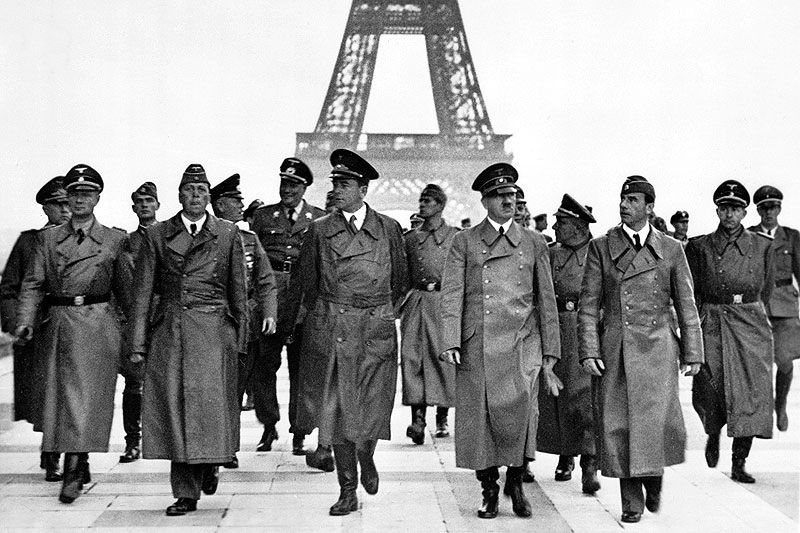 Adolf Hitler and his followers in Paris after the German victory over France. Bormann walks on his right behind him. Source: Bundesarchiv / Wikimedia Commons.
Adolf Hitler and his followers in Paris after the German victory over France. Bormann walks on his right behind him. Source: Bundesarchiv / Wikimedia Commons.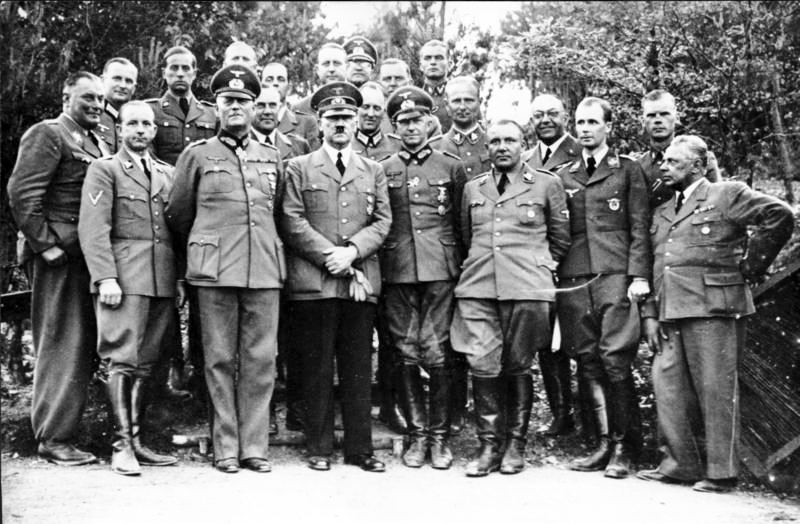 Hitler and his associates at the Wolfsschanze in June 1940. On Hitler's left Wilhelm Keitel, on his right Alfred Jodl. Bormann stands next to Jodl. Source: Bundesarchiv / Wikimedia Commons.
Hitler and his associates at the Wolfsschanze in June 1940. On Hitler's left Wilhelm Keitel, on his right Alfred Jodl. Bormann stands next to Jodl. Source: Bundesarchiv / Wikimedia Commons.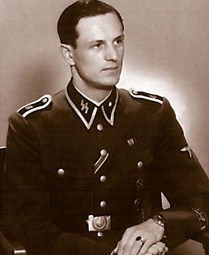 Rochus Misch, Hitler's personal bodyguard and courier. Source: BBC News.
Rochus Misch, Hitler's personal bodyguard and courier. Source: BBC News.Holocaust and persecution
The German historian Joseph Wulf later described Bormann as one of the greatest initiators of the Holocaust, the "Endlösung der Judenfrage" (final solution of the Jewish question). Bormann was involved early in anti-Jewish measurements. He was one of the driving forces behind a decree, issued on August 17th, 1938, in which Jews were obliged to add Israël or Sara to their Christian name. In the wake of the Kristallnacht of November 9th and 10th, 1938, during which Jewish possesions were demolished on a large scale, Bormann sent a letter to Hermann Göring. In this document he wrote that Hitler wished a co-ordinated solution to the Jewish question. Göring charged Reinhard Heydrich with this task, which ultimately would lead to the extermination of the Jews.
Bormann was a strong anti-Semite and a great advocate of the most stringent measures against the Jews. Many of the anti-Jewish decrees bear his signature. This was for instance the case with the decree that introduced the Nuremberg laws ( September 15th, 1935 and November 14th, 1935) in the territories captured by Germany (issued on May 31st, 1941) and the decree that stipulated the expropriation of Jewish assets. Whenever a draft of an anit-Jewish decree was submitted, he often urged, on behalf of the party, to make it more severe. His suggestions were usually accepted. Bormann himself was not present at the Wannsee conference of January 20th, 1942 where the groundwork for the execution of the Holocaust and the parties involved was laid. He was represented by Dr. Gerhard Klopfer, chief of the "Staatrechtliche Abteilung III der Parteikanzlei" (judicial department of the party chancellory). He was however undoubtedly aware of what had been discussed and surely supported the policy that was decided upon.
On October 9th, 1942, Bormann sent a circular to all party members in which he wrote: "The permanent elimination of the Jews from the Greater German territory can no longer be achieved by emigration but only by ruthless and savage treatment in the camps in the eastern territories". On October 23rd, 1942, Bormann sent a decree to the "Stellvertretender Reichsminister für Landwirtschaft und Nährung" (Deputy Stateminister of Agriculture and Foodstuffs), Herbert Backe, on behalf of the Ministry of Foodstuffs ordering to limit the rations for Jews to an essential minimum. He also stood at the base of the decree of July 1st, 1943, stating that Jews were no longer allowed to institute judicial proceedings and from then on had to turn to Heinrich Himmler’s police services. The decree also stipulated that when Jews died, their assets would be reverted to the German State.
Bormann also advocated a ruthless policy against the Slav population in the eastern territories that had been captured by Germany. He was involved in the introduction of a special criminal law in these areas that, in his opinion, would better fit the local situation.
On December 4th, 1941, a decree was issued for the occupied territories in the east, imposing the death sentence on various crimes, including the possibility of collective punishment. Bormann supported the inhuman policy of Erich Koch, reportedly one of his few friends. Koch was "Reichskommissar" (State commissioner) in the Ukraine and one of the persons most responsible for the barbaric occupation policy in the east. In Bormann’s view, Slavs who could not work had no right to live and should be exterminated out of hand.
On July 23rd, 1941, Bormann wrote to "Reichsminister für die besetzten Gebiete im Osten" (Stateminister for the occupied territories in the east), Alfred Rosenberg who advocated a less stringent policy: "German health care should definitely not be made available to the non-German population in the east, the non-German population is absolutely forbidden to receive higher education". He also urged not to repair the war damage inflicted on Ukrainian and Russian cities, since these were unsuitable for habitation by Germans anyway. In another letter to Rosenberg he wrote: "The Slavs are there to work for us. In so far as we do not need them, they should die. The fertility of the Slavs is undesired. If they have to be fed, they should receive no more food than what is absolutely necessary. We are the masters, we come first".
On February 12th, 1943, Bormann sent a circular to the "Allgemeines Wehrmachtamt" (AWA or General Wehrmacht office), part of the OKW (Oberkommando der Wehrmacht, supreme command of the Wehrmacht) which was charged with supervising the prisoners of war, in which he complained about the punishment of Russian PoW’s which apparently was not severe enough. Bormann would complain more often about what he considered the mild treatment of the captured Russian soldiers. In reality, the regime these people had to endure was harsh as it was: three million Russian military would perish in German prison camps.
On September 13th, 1944, Bormann decreed that the administration of the PoW camps would henceforth be allocated to partymembers. This in order to ensure that a harsh policy would be laid down in the camps.
Apart from Jews and Slavs, Bormann also felt a deep hatred for Christianity. In his opinion, Christianity and National Socialism could not co-exist. He wished to replace religion by some other ideology, based more on Germanic beliefs. By issuing circulars, he attempted to limit the influence of the Church. In 1938, he ordered that members of the clergy should not be allowed to become party members and that anyone who considered joining the clergy should terminate his membership. Bormann also tried to have the theological faculty at universities closed down but in this he failed. He did however manage to limit the time spent on theological education in elementary schools and that crucifixes were removed from classrooms.
Bormann had a contemptuous attitude towards education in general. In September 1940 he proposed that classes in schools should not start until noon. When the Ministry of Education protested against this, because, especially in winter, the number of hours available for schooling would be severely reduced, he reacted condescendingly. "Nobody has died of stupidity yet." said the Reichsleiter in a conversation with the State Secretary.[1] The mandatory reduction of the class schedule ultimately did not happen. This does not alter the fact that schools had to significantly reduce the number of teaching hours during the war, partly due to the scarcity of materials and because more and more teachers were called up for the army.
Bormmn was also involved in the expropriation of buildings and goods that had belonged to the Church in Germany and Austria. Bormann went so far in his persecution of Christianity that it caused other Nazi leaders to complain to Hitler about the behaviour of the chief of the Parteikanzlei. They feared that Bormann’s actions against the Church would result in the Church turning against the Third Reich and that the enemy would use these actions in his propaganda which would damage the German cause. Hitler agreeed and forced Bormann to restrain himself.
Definitielijst
- Abteilung
- Usually part of a Regiment and consisting of several companies. The smallest unit that could operate independently and maintain itself. In theory an Abteilung comprised 500-1,000 men.
- Endlösung
- Euphemistic term for the final solution the Nazis had in store for the “Jewish problem”. Eventually the Endlösung would get the form of annihilating the entire Jewish people in extermination camps.
- Holocaust
- Term for the destruction of European Jewry by the Nazis. Holokauston is the Greek term for a completely burnt sacrifice.
- ideology
- A collection of principles and ideas of a certain system.
- Jews
- Middle Eastern people with own religion that lived in Palestine. They distinguished themselves by their strong monotheism and the strict observance of the Law and tradition. During World War 2 the Jewish people were ruthlessly persecuted and annihilated by the German Nazis. . An estimated 6,000,000 Jews were exterminated.
- National Socialism
- A political ideology drawn up by Hitler based on the superiority of the German race, the leader principle and fierce nationalism that was fed by the hard Peace of Versailles. National socialism was anti-democratic and racist. The doctrine was elaborated in Mein Kampf and organised in the NSDAP. From 1933 to 1945 National socialism was the basis of totalitarian Germany.
- Nazi
- Abbreviation of a national socialist.
- Nuremberg laws
- Laws promulgated by Hitler on the party convention on 15 September 1935. These laws alter alia included regulations about marriage and intercourse between Jews and non-Jews. Jews were deprived of German citizenship. Also known as the racial laws.
- OKW
- “Oberkommando der Wehrmacht”. German supreme command of the Armed Forces, Army, Air Force and Navy.
- PoW
- Prisoner of War.
- propaganda
- Often misleading information used to gain support among supporters or to gain support. Often used to accomplish ideas and political goals.
- Reichskommissar
- Title of amongst others Arthur Seyss-Inquart, the highest representative of the German authority during the occupation of The Netherlands.
- Socialism
- Political ideology aiming at slight or no class differences. Means of production are owned by the state. Evolved as a response to capitalism. Karl Marx tried to substantiate socialism scientific.
- Wannsee conference
- Conference at the Wannsee on 20 January 1942. The Nazi’s made final agreements about the extermination of Jews in Europe, the Final Solution (Ëndlösung).
- Wehrmacht
- German armed military forces, divided in ground forces, air force and navy.
Images
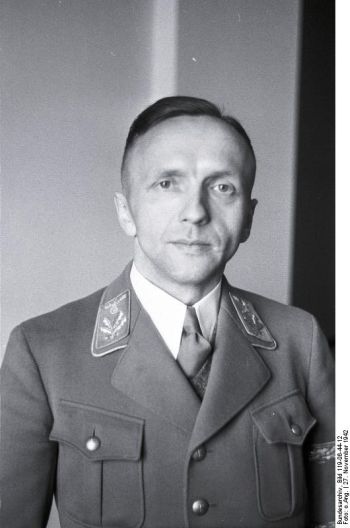 Dr. Gerhard Klopfer. He represented Bormann at the Wannsee conference. Source: Bundesarchiv / Wikimedia Commons.
Dr. Gerhard Klopfer. He represented Bormann at the Wannsee conference. Source: Bundesarchiv / Wikimedia Commons.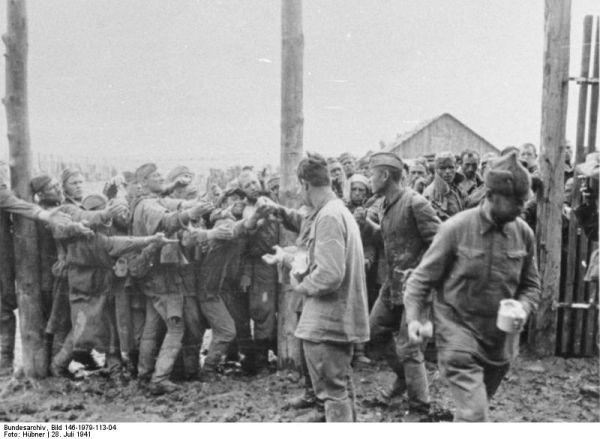 PoWs of the Red Army are being given bread in a camp in the Ukraine Source: Bundesarchiv / Wikimedia Commons.
PoWs of the Red Army are being given bread in a camp in the Ukraine Source: Bundesarchiv / Wikimedia Commons.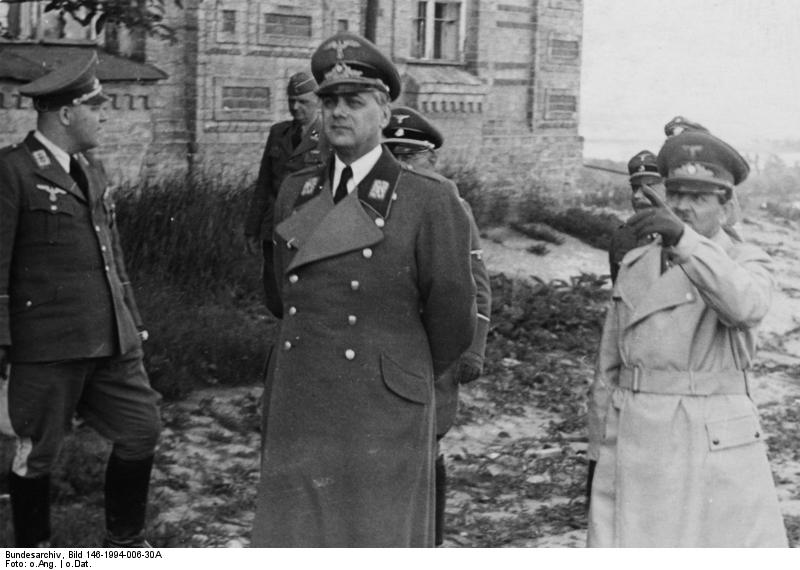 Erich Koch (right), one of Bormann's few friends. He supported Koch's harsh regime in the East. In the center, Alfred Rosenberg, advocate of a less stringent regime. Source: Bundesarchiv / Wikimedia Commons.
Erich Koch (right), one of Bormann's few friends. He supported Koch's harsh regime in the East. In the center, Alfred Rosenberg, advocate of a less stringent regime. Source: Bundesarchiv / Wikimedia Commons.Expansion of power
After the failed assassination attempt on Hitler on July 20th, 1944, by Claus Schenk Graf von Stauffenberg (Bio Von Stauffenberg) and his co-conspirators, Bormann’s power increased even more. As a result of this attempt and the attempted coup d’état by officers of the armed forces, Hitler lost all confidence in the Wehrmacht and came to rely even more on party organs. The regime became more radical. One of Hitler’s moves was to appoint the militarily incapable Heinrich Himmler commander of the Ersatzheer (reserve army). Bormann supported this promotion. When it turned out that Himmler had little success in this role, Hitler’s esteem for Himmler dwindled, something Bormann surely appreciated.
Bormann’s power increased while Hitler’s Third Reich shrank ever further. His Brown Eminence managed to exploit the situation to his own advantage, bringing him yet more influence and functions. Among other things, the Parteikanzlei was given supervision over the evacuation of the population on the border and was charged with aiding citizens after Allied bombing attacks. Bormann became the "Bevollmächtigte" (plenipotentiary) for the deployment for total war of the party. He managed to increase the power of the party greatly and further strengthened its grip on the state and society. Hitler’s secretary, for instance, was given the power to cut down on the staff of certain party agencies or closing them altogether, sending the employees to the front. It was the duty of the Gauleiter to organize civil defence in case capture of their territory by the Allies was imminent. In their capacity as "Reichsverteidigungskommissar" (commissioner for national defence), they were authorized to give orders in all spheres to all civil servants and for instance also drafting people to assist in building defence fortificaties. Because of this they evolved into de facto supreme rulers over their territories, answerable only to Bormann.
On September 1st, 1944, Bormann was authorized by Hitler as the only one to: "instruct the Gauleiter on my behalf pertaining to all measures involving fortifications". Again an expansion of his power. Meanwhile, the Parteikanzlei pushed the Reichskanzlei out more and more as a body of power. There was no sphere of policy left on which the party or one of its subsidiaries had no influence. After the assassination attempt and the coup of July 20th, 1944, the nazification of the army was expanded, among others things by increasing the number of "Nationalsozialistischer Führungsoffiziere" (NSFO, Nazi officers commanding). Another measure was replacing the military salute by the Nazi salute.
Bormann was also one of the driving forces behind the establishment of the Volkssturm (people’s army). This national militia was established on October 18th , 1944, by decree of Hitler and consisted of all able men between the ages of 16 and 60 who did not yet serve in the military. The Volkssturm was intended to halt the steadily advancing Allied forces. Bormann was put in charge of the organizational and political direction of this paramilitary formation. Military direction was in the hands of Heinrich Himmler. Because of his proximity to Hitler, Bormann evolved into the most powerful man within the organzation. Every appointment for a command post was to be authorized by him personally. Bormann had urged that the Volkssturm be made subordinate to the party instead of to the "untrustworthy" Wehrmacht. The higher cadre consisted entirely of Gauleiter and other party officials. The Gauleiter were charged with recruitment and the structuring of the companies.
Bormann personally designed decorations for the organization and he set up a training programme. During this course they were taught to lead in the spirit of Adolf Hitler and they were told why they should hate their enemies. There was hardly any specific military training due to the lack of time and means. Owing to the shortage of uniforms, the members were recognizable by an armband with the caption: Deutscher Volkssturm Wehrmacht". For want of better, the men of the Volkssturm were armed with captured Belgian, French, Italian and Czech rifles. In 1944-45, these weapons were already obsolete and moreover, hardly any ammuntion was available. Members were often equiped with a "Panzerfaust" (armour fist), an effective anti-tank weapon which could only be used once. Military effectiveness of the unit was poor. The Volkssturm did however prolong a war that was already lost and caused still more needless losses in men and equipment.
Definitielijst
- Gauleiter
- Leader and representative of the NSDAP of a Gau.
- Nazi
- Abbreviation of a national socialist.
- Panzerfaust
- German anti-tank gun used by the infantry. Consists of a long tube with the grenade mounted at the front side. It was a disposable weapon. After being used it cannot be reloaded. Major disadvantage is the long flame back blast from the tube.
- Wehrmacht
- German armed military forces, divided in ground forces, air force and navy.
Images
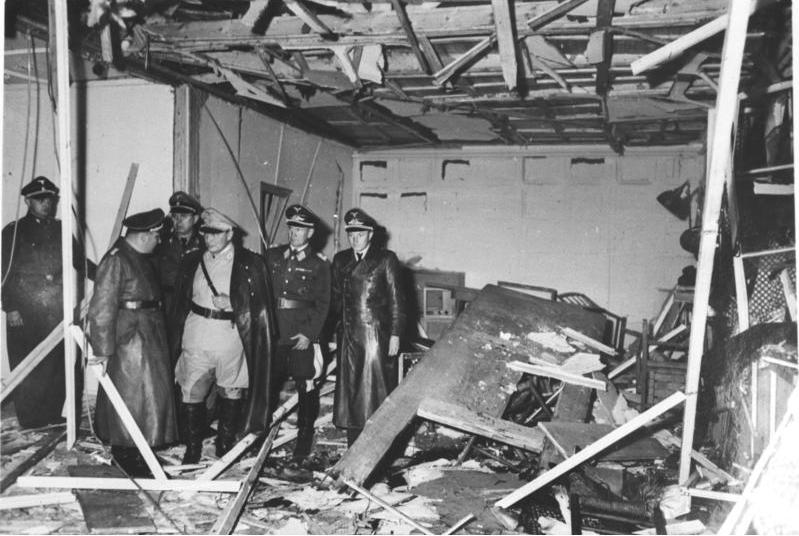 Bormann (left front) and Hermann Göring inspecting the barracks where the failed assassination attempt on Hitler was made by Von Stauffenberg. Source: Bundesarchiv / Wikimedia Commons.
Bormann (left front) and Hermann Göring inspecting the barracks where the failed assassination attempt on Hitler was made by Von Stauffenberg. Source: Bundesarchiv / Wikimedia Commons.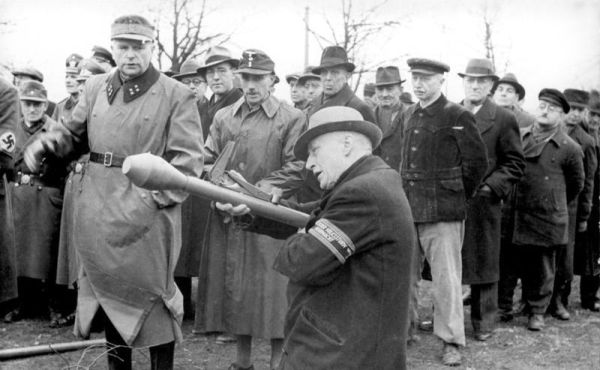 Members of the Volkssturm being instructed in the use of the Panzerfaust. Bormann was instrumental in the establishment of the People's militia. Source: Bundesarchiv / Wikimedia Commons.
Members of the Volkssturm being instructed in the use of the Panzerfaust. Bormann was instrumental in the establishment of the People's militia. Source: Bundesarchiv / Wikimedia Commons.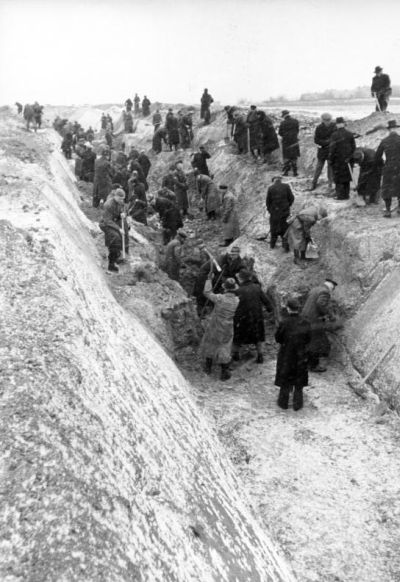 Members of the Volkssturm digging an anti-tankditch for the defence of Berlin. Source: Bundesarchiv / Wikimedia Commons.
Members of the Volkssturm digging an anti-tankditch for the defence of Berlin. Source: Bundesarchiv / Wikimedia Commons.In the Führerbunker
The Nazi bureaucracy, local as well in Berlin, seemed to increase as the situation deteriorated, undoubtedley to give the impression that the party still had everything under control. Even then, as the logistical situation in Germany was grinding, an avalanche of decrees and instructions was issued, in 1944 alone 1372. Early 1944, Bormann still issued circulars announcing the importance of taking good care of the German language, he gave instructions for the production of ice-cream and rules about whether or not it was to be permitted to consume one’s own food in a restaurant or so. All of it proof of how far not only Hitler but Bormann as well had become estranged from reality. Early 1945 he issued a decree urging the German population to limit the keeping of pets in order to save food. A number of his decrees were a lot more criminal in nature. In one of those, dated May 30th, 1944, he wrote that German citizens were no longer to be prosecuted and sentenced if they had lynched downed Allied airmen. On September 30th, 1944 Bormann issued a decree, transfering the authority over PoW’s from the AWA to the SS.
On February 2nd, 1945, Bormann took up residence in the Führerbunker beneath the Reichs chancellory in Berlin. The next day, the office building of the Parteikanzlei was hit during an American bombing attack on Berlin. Due to his continuing nearness to Hitler Bormann was very well informed about the military situation of Germany. Outwardly, he continued to give the impression that Germany was going to win the war and he called on everyone to resist to the utmost. In a decree of February 24th, 1945, he wrote about the willingness to die fighting and so ensure ultimate victory. Anyone unwilling to do so was a coward and deserved nohing else than a bullet. In a letter to his wife, dated February 5th , 1945, he wrote that one had to be a profound optimist to give Germany still a chance. Bormann however was such an optimist because he wrote in the same letter: "I simply cannot believe that fate has guided our people and our Führer so far along this brilliant road, only to desert us now and watch us disappear forever". Bormann’s fanaticism is puzzling. He knew the Third Reich was on the verge of collapse, yet he maintained a blind faith in the Führer. His loyalty and servility to the Führer went so far that he had a closer relationship with Hitler and felt more affection for him than for his own family.
Meanwhile, higher party officials set a less inspiring example to the German population. A notorious case is that of Arthur Greiser, Gauleiter of the Reichsgau Wartheland. He prohibited the evacuation of the population up to the last moment. When the Red Army threatened to capture the Gau, he did flee on January 20th, 1945, leaving the Gau in chaos to the Russians. On February 24th, 1945, Bormann urged all party officials to conduct themselves in exemplary fashion during evacuation. Whoever abandoned his post too early would summarily be punished by death. In February 1945, Bormann also issued decrees, explaining to the German population how to bake their own bread and with which plants growing in the wild they could feed themselves. As he had worked on a farm for a couple of years, he considered himself an expert in the field of agriculture. Although he called on all party members to abstain from parties and jubllees, in the bunker he often indulged in drinking orgies along with the others. Various persons have declared finding Bormann dead drunk on numerous occassions. Bormann loved a drink at times and also was a heavy smoker but never in the presence of the non-smoking and total abstainer Hitler.
In March 1945, Bormann was involved in the promulgation of the "Nero Befehl" Hitler had ordered that when Allied troops neared, the complete German infrastructure, i.e. bridges, roads, buildings and stockpiles be demolished to prevent the enemy from using them. Bormann was also involved in Aktion Werwolf, an appeal to the German population to inflict damage on the hostile armies by partizan action.
Meanwhile the Third Reich teetered on the brink of the abyss. The battle for Berlin was about to begin. On April 21st , 1945 the city was in danger of being encircled by Soviet troops and the government quarter came under fire from their artillery. Meanwhile, Adolf Hitler became increasingly desperate. He saw treason all around him and his already poor health deteriorated even further. On April 22nd , during the afternoon meeting, Hitler suffered an hysterical attack. According to him he was surrounded by misfits and traitors. He declared that the war was lost and he did not have any further orders for the Wehrmacht (he later countermanded this). Anyone who wished to do so, was free to leave the Führerbunker. He himself would stay in Berlin to committ suicide at the very last moment. After the meeting had been closed, Bormann apparently would have said, highgly upset: "The Führer can never have said in earnest that he is going to shoot himself. We must stop the Führer from doing so".
On April 23rd, Hermann Göring sent a telegram from the Obersalzberg proposing he would take over the leadership of the Reich, in accordance with earlier decrees of the Führer. According to the Reichsmarshall, Hitler was now in a situation in which he was no longer capable to govern, since he had decided to stay in beleaguered Berlin. Bormann argued that this amounted to treason. On his urging, an answer was sent, stripping Göring of all his functions. Later, Bormann sent another message calling on the SS to arrest Göring. On April 28th , the Swedish radio announced Heinrich Himmler had attempted to enter negotiations with the Allies. Hitler was highly upset by this treason of "Der treue Heinrich" (the faithful Heinrich). Bormann wrote in his diary: "Others believe they should act according to divine fate. They sacrifice the Führer and their loyalty to the devil, just as their sense of honour".
On April 27th, Bormann also ordered the arrest of SS-Brigadeführer Hermann Fegelein after he had refused to report to the Reichskanzlei. Fegelein, Eva Braun’s brother-in-law was discovered in the company of another woman and he had made preparations to flee. After his arrest, Fegelein was downgraded to SS-Mann (lowest rank within the SS). When it turned out that he had been aware of the attempt at negotiation by Heinrich Himmler, he was sentenced to death and executed on the spot.
These events strengthened Hitler’s and Bormann’s conviction they were surrounded by traitors. The next day, April 29th, Adolf Hitler married Eva Braun. The witnesses were Joseph Goebbels (Bio Goebbels) and Martin Bormann. After the ceremony, Hitler dictated his political last will and testament. Grossadmiral Karl Dönitz (Bio Dönitz) was appointed Reichspräsident and Joseph Goebbels Reichskanzler. Bormann, according to Hitler "his most loyal partycomrade" was named Partyminister and he also acted as executor of his will.
In the afternoon of April 30th, 1945, Adolf Hitler and Eva Braun committed suicide. Subsequently their bodies were cremated in the garden of the Reichskanzlei according to Hitler’s earlier instructions. Bormann assisted in carrying the bodies outside and was also present at the burial ritual. Afterwards, Bormann sent the Führer’s political testament to Dönitz but refrained from telling him that he had already committed suicide. Furthermore, Bormann wrote he would come to see Dönitz to explain the situation further. Dönitz had moved to Pion near Flensburg. Bormann and Goebbels tried to enter negotiations with Gheorghi K. Zhukov (Bio Zhulov), commander of the Soviet troops in Berlin to try to achieve an armistice. The leader of the Soviet Union, Joseph V. Stalin (Bio Stalin) however indicated that only unconditional surrender by Germany woul be agreed to.
Definitielijst
- Führer
- German word for leader. During his reign of power Adolf Hitler was Führer of Nazi Germany.
- Gau
- “Shire”. District in the Third Reich established by the NSDAP.
- Gauleiter
- Leader and representative of the NSDAP of a Gau.
- Nazi
- Abbreviation of a national socialist.
- PoW
- Prisoner of War.
- Red Army
- Army of the Soviet Union.
- Soviet Union
- Soviet Russia, alternative name for the USSR.
- Wehrmacht
- German armed military forces, divided in ground forces, air force and navy.
Images
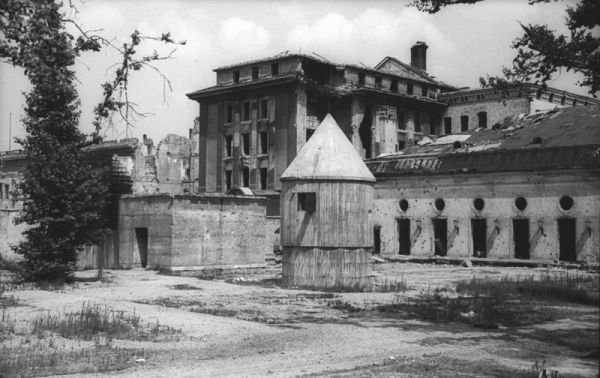 The entrance of the Führerbunker after the war. Source: Bundesarchiv / Wikimedia Commons.
The entrance of the Führerbunker after the war. Source: Bundesarchiv / Wikimedia Commons.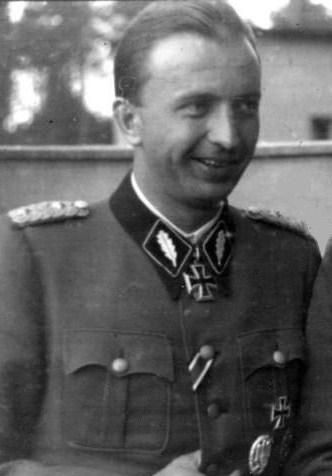 Hermann Fegelien. On April 27th, 1945, Bormann ordered his arrest. Later on, he was sentenced to death and executed immediately afterwards. Source: Bundesarchiv / Wikimedia Commons.
Hermann Fegelien. On April 27th, 1945, Bormann ordered his arrest. Later on, he was sentenced to death and executed immediately afterwards. Source: Bundesarchiv / Wikimedia Commons.His demise
When the end of the Third Reich seemed definite, Bormann sent a last radiomessage to his secretary Helmut von Hummel. He ordered his wife and children, who were staying at the Obersalzberg at that time, be taken to southern Tirol. On May 1st, 1945, he told his secretary in Berlin, Else Krüger: "Well, see you later then, it doesn’t make much sense anymore. I’ll give it a try but I may not get through anyway". Along with Artur Axmann (Bio Axmann) and SS-Oberststurmbannführer Ludwig Stumpfegger, Hitler’s personal physician, he left the bunker the next day. Historian Wulf stated that Bormann, prior to his departure, had decreed that all death sentences should be suspended and the actions of the Werwolf be terminated.
Bormann was last seen during the evacuation of the Führerbunker following Hitler’s suicide and since then, nothing was ever heard of him. On October 15th, 1946, he was found guilty of war crimes and crimes against humanity by the International Military Tribunal at Neurenberg and sentenced to death in absentia. A few people, including his co-escapee Artur Axmann stated that Bormann was killed while trying to escape from Berlin. Soon after however, rumours circulated that Bormann was still alive. He would have been sighted in an Italian monastery; other sources claimed he had been seen in Brazil, Chili and Argentinia were he lived as a millionaire for years. It was even contended Bormann was a Russian agent living in the Soviet Union.
Artur Axmann had seen the remains on May 2nd, 1945 in the Invalidenstrasse, north of the river Spree near the Lehrter railway station, as well as two other witnesses who had later been taken prisoner by the Red Army. Their testimony however has not been taken seriously by everyone. Historian Hugh Trevor-Roper did believe Axmann’s story when he published a book in 1947 about Hitler’s last days. On March 10th, 1954, the court in Berchtesgaden declared Bormann virtually dead. Afterwards, his assets (representing a value of 36.000 Reichsmark were confiscated.
In December 1972 during construction work at the spot where Bormann’s remains would have been seen, two skeletons were found. On both corpses, traces of cyanide capsules were discovered. One of the two skeletons had the correct posture and age to be Martin Bormann. After post-mortem dental data and other specific details matched the data about Bormann still contained in the archives and in April 1973 this was sufficient for German authorities to declare Bormann officially dead. To others, this was no satisfactory conclusion however and theories about conspiracy and Bormann’s real whereabouts kept going round. In 1996, the former British agent Christopher Creighton claimed in his book "Operation JB" that in 1945 Bormann had been kidnapped by the British Secret Service in order to gain access to the bankaccounts of the NSDAP. He was however unable to corroborate this story with conclusive evidence.
As late as 1998, by comparing the DNA material with that of the family members, it could be determined, that one of the corpses that had been discovered in 1972, was definitely that of Martin Bormann. The remaining bones were cremated and the ashes were scattered over the Baltic Sea on August 16th, 1999.
Gerda Bormann died of cancer on March 23rd, 1946 in a military hospital in Mirano, Italy. Out of the 10 Bormann children, nine survived the war; the youngest, Volker having died as early as 1946. The other children were later adopted by a clergyman, Theodor Schmitz. Ilse Eike Bormann died in 1958. Adolf Martin Bormann, the eldest son and who appeared most in public after the war, speaking about his father, was ordained a priest in 1958. He became a missionary and worked in the Congo for years. Later he resigned from the Order. He got married and afterwards taught philosophy and theology. Adolf Martin Bormann passed away on March 11th, 2013. The children later stated they had considered their father stern but righteous. Adolf Martin made a distinction between the father Bormann he loved and the politician Bormann whose actions he condemned.
Definitielijst
- crimes against humanity
- Term that was introduced during the Nuremburg Trials. Crimes against humanity are inhuman treatment against civilian population and persecution on the basis of race or political or religious beliefs.
- Red Army
- Army of the Soviet Union.
- Soviet Union
- Soviet Russia, alternative name for the USSR.
- war crimes
- Crimes committed in wartime. Often concerning crimes committed by soldiers against civilians.
Images
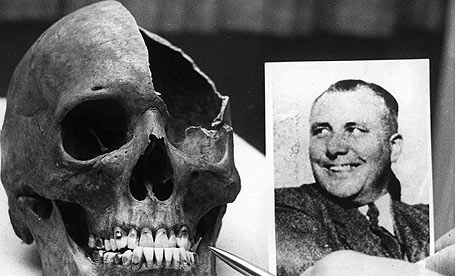 Bormann’s skull, discovered during construction works on the spot where Bormann would have been seen last. Source: ww2gravestone.com.
Bormann’s skull, discovered during construction works on the spot where Bormann would have been seen last. Source: ww2gravestone.com.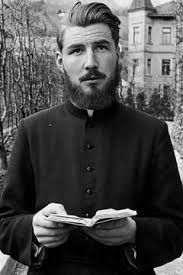 Adolf Martin Bormann, eldest son of Martin Bormann, who was ordained a priest after the war. Source: ww2gravestone.com.
Adolf Martin Bormann, eldest son of Martin Bormann, who was ordained a priest after the war. Source: ww2gravestone.com.Epilogue
Although Martin Bormann often appeared as the "shadow man", to the outside world, he did possess much authority within Nazi Germany. He was extremely hungry for power and he did everything to expand this power. How much influence Bormann exactly had on Hitler is hard to determine since this was something between Hitler and Bormann and neither man survived the war. It is a fact though that many of Hitler’s decrees were drafted by Bormann and that he managed to isolate the Führer almost completely from the other high ranking Nazis who did not have direct access to him. Many decisions were taken on behalf of Hitler but probably by Bormann himself. Historian Ian Kershaw described Bormann as probably the most important man within the Nazi regime, second to Hitler. Bormann’s role within the Third Reich remains a dual one however because on the one hand he was the spokesman for Hitler, on the other hand, especially during the final months of World War Two, he was one of the most powerful figures within the Third Reich.
See also: Verdict Bormann
Notes
- Prenger 2024, p. 223
Definitielijst
- Führer
- German word for leader. During his reign of power Adolf Hitler was Führer of Nazi Germany.
- Nazi
- Abbreviation of a national socialist.
Images
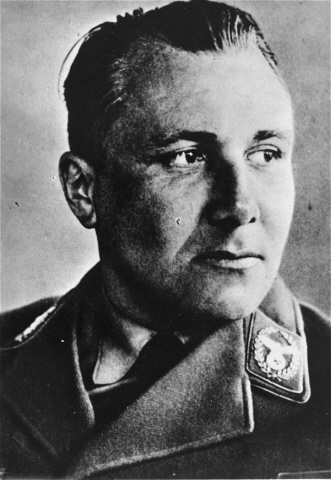 Martin Bormann in 1934. Source: United States Holocaust Memorial Museum.
Martin Bormann in 1934. Source: United States Holocaust Memorial Museum.Information
- Article by:
- Wesley Dankers
- Translated by:
- Arnold Palthe
- Published on:
- 19-01-2025
- Feedback?
- Send it!
- 10-'46: Judgement at Nuremberg
The War Illustrated
Related sights
Sources
- Bericht van de Tweede Wereldoorlog, Amsterdam Boek, Amsterdam, 1970.
- BEEVOR, A., De Tweede Wereldoorlog, Ambo|Anthos, Amsterdam, 2012.
- HOEK, K. VAN DEN, De Verschrikkingen van het Nazi-systeem, Lekturama, Rotterdam, 1978.
- KERSHAW, I., Tot de laatste man (hardcover), Unieboek / Het Spectrum, Houten, 2011.
- MISCH, R., De laatste getuige, Just Publishers, Meppel, 2014.
- PRENGER, KEVIN, Van kinderwieg tot soldatengraf, Just Publishers, 2024.
- WULF J., Martin Bormann, Publiboek, Amsterdam, 1980.
- de.wikipedia.org
- de.wikipedia.org
- www.jewishvirtuallibrary.org
- YouTube: Hitler's Henchmen - The Secretary Martin Bormanne
With thanks to Hans Molier, whose original article on Martin Bormann, published here, has been a valuable source for writing this version.
